RBSE Solutions for Class 5 Maths Chapter 15 Capacity
Rajasthan Board RBSE Solutions for Class 5 Maths Chapter 15 Capacity Textbook Exercise Questions and Answers.
The questions presented in the RBSE Solutions for Class 5 Maths are solved in a detailed manner. Get the accurate RBSE Solutions for Class 5 all subjects will help students to have a deeper understanding of the concepts.
RBSE Class 5 Maths Solutions Chapter 15 Capacity
Intext Questions:
Question 1.
See your surrounding items and find which of them is measured by weighing and which of them is measured by filling certain shape of containers.
Solution:
|
Items which are given by weighing, Sugar, pulses, vegetables, rice etc. |
Items which are given by filling specific shape of container. Milk, curd, oil, kerosene oil etc. |
Question 2.
What is the relation between the size of a container with 1 litre capacity and the size of different containers ?
Solution:
The required relation can be understood as follow :
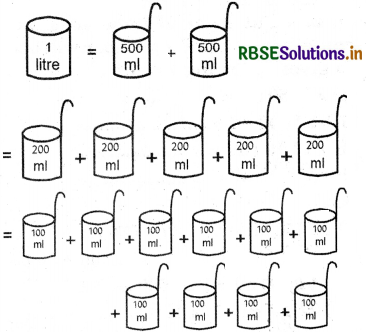

Practice Work:
Question 1.
How much litre of oil will be obtained from given measure?
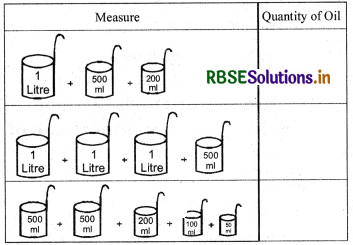
Solution:
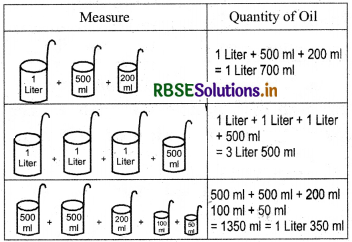
Question 2.
What kind of measurement containers will a shopkeeper will use to gives following quantities.
(i) 2 l 750 ml =
(ii) 1 l 600 ml =
(iii) 4 l 250 ml =
(iv) 3 l 800 ml =
Solution:
(i) 2 l 750 ml = 1 l + 1 l + 500 ml + 200 ml + 50 ml
(ii) 1 l 600 ml = 1 l + 500 ml + 100 ml
(iii) 4 l 250 ml = 1 l + 1 l + 1 l + 1 l + 200 ml + 50 ml
(iv) 3 l 800 ml = 1 l + 1 l + 1 l + 500 ml + 200 ml + 100 ml

Exercise 15.1
Question 1.
Radha pours out 3 water containers of 500 ml, 200 ml and 100 ml respectively into a thermos. Now the thermos is exactly half filled. Find the capacity of thermos.
Solution:
Total quantity of water = 500 ml + 200 ml + 100 ml = 800 ml
Thermos is half filled.
∴ Capacity of thermos = 2 × 800 ml
= 1600 ml or 1 l 600 ml
Thus, capacity of thermos is 1 l 600 ml.
Question 2.
Capacity of a small can is 3 litre. How much amount of kerosene, will be required to fill 8 such cans.
Solution:
Capacity of a can = 3l
Total kerosine in 8 such cans
= 8 x 3 = 24 l

Question 3.
How many packets of milk having capacity of 250 ml can be packed from 10 litre amount of milk?
Solution:
1 l milk = 1000 ml
10 Z milk = 10 × 1000 ml = 10000 ml
For 250 ml, milk bag required = 1
for 10000 ml, milk bag required = \(\frac{1}{250}\) × 10000
= \(\frac{10000}{250}\) packets = 40 packets
∴ No. of packets = 40
Question 4.
10 cans of 5 litre, 20 cans of 3 litre, 15 cans of 2 litre can be filled from oil drum of 200 litre. How many cans of 1 litre can be filled from remaining amount of oil ?
Solution:
Let oil remains a litre, then 200 = (5 × 10) + (3 × 20) + (2 × 15) + (a)
⇒ 50 + 60 + 30 + a = 200
⇒ 140 + a = 200
⇒ a = 200 - 140 = 60
Thus, required cans = 60

Question 5.
Fill in the blanks :
(i) 3 containers of capacity ________ ml can be fully filled from 1\(\frac{1}{2}\) litre of quantity.
Solution:
500
(ii) 1 litre of container can be filled by using 500 ml of container ________ times.
Solution:
2
(iii) The price of 2 litre 250 ml milk is ________ at the rate of ₹ 40 per litre.
Solution:
90
(iv) How many millitre are there in 1 litre ?
Solution:
1000 ml

Question 6.
A water tank is filled by a tap from above while it is emptied by another tap at the bottom. If the above tap fills with the speed of 25 litre per hour and the bottom tap drains it with the speed of 10 litre per hour. After 4 hours what will be the amount of water left in the tank (imagine initially the tank was empty)
Solution:
In 1 hour water filled in tank = 25
1 hour water drawn from tank = 10 l
Thus in 1 hr, water fills in tank = 25 - 10 = 15 l
Similarly, in 4 hrs water remains in tank = 15 x 4 = 60 l
Thus, when two taps are on, then 60 l water will remained in 4 hrs.
Exercise 15.2
Question 1.
How many meters are there in 3 km ?
Solution:
1 km = 1000 m
Thus, 3 \(\frac{1}{2}\) km = \(\frac{7}{2}\) × 1000
= 7 × 500 = 3500 m
Question 2.
Convert 6500 gm into kilogram.
Solution:
1 gm = \(\frac{1}{1000}\) kg
Thus, 6500 gm
= 6500 × \(\frac{1}{1000}\) = \(\frac{6500}{1000}\)
= \(\frac{65}{10}=\frac{13}{2}=6 \frac{1}{2}\) kg

Question 3.
Convert 2250 ml into litre.
Solution:
1 ml = \(\frac{1}{1000}\) l
Thus, 2250 ml
= 2250 × \(\frac{1}{1000}\) = \(\frac{2250}{1000}\) l
= 2.250 l
= 2\(\frac{1}{4}\) l
Question 4.
Convert 18000 ml into litre.
Solution:
1 ml = \(\frac{1}{1000}\) l
Thus, 18000 ml
= 18000 × \(\frac{1}{1000}\)
= \(\frac{18000}{1000}\) = 18 ml
Question 5.
Express 75000 gm into kilogram.
Solution:
1 gm = \(\frac{1}{1000}\) kg
Thus, 75000 gm = 75000 × \(\frac{1}{1000}\)
= \(\frac{75000}{1000}\) = 75 kg

Question 6.
How many ml will be there in 2 l?
Solution:
Two and half litre = 2\(\frac{1}{2}\) l = \(\frac{5}{2}\) l
1 l = 1000 ml
Thus, \(\frac{5}{2}\) l = \(\frac{5}{2}\) × 1000
= 5 × 500 = 2500 ml
Question 7.
How many grams are there in
Solution:
One and half kilogram = 1\(\frac{1}{2}\) gm
1 kg = 1000 kg
Thus, \(\frac{3}{2}\) kg = \(\frac{3}{2}\) × 1000 gm
= 3 × 500 gm = 1500 gm

Question 8.
How many mm will be there in 3m?
Solution:
1 m = 1000 mm
Hence, 3 m = 3 × 1000 mm
= 3000 mm
Question 9.
How many drums having capacity of 20 litre can be filled from 5000 l capacity of water tanker ?
Solution:
20 l water filled in = 1 drum
5000 l water filled in = 5000 × \(\frac{1}{20}\) drums
= \(\frac{5000}{20}\) drums = 250 drums
Thus, required drums = 250

Question 10.
One oil container contains 15 l oil. How much container will bought to fill 3750 l oil ?
Solution:
15 l oil filled in = 1 container
3750 l oil litre in 1 × 3750 = \(\frac{1 \times 3750}{15}\) containers
= 250 container
Thus, to fill 3750 l oil, required containers will be 250.
Question 11.
An oil container contains 13 kg 500 gm oil. Find total weight of 48 such containers.
Solution:
∵ One container contains oil = 13 kg 500 gm
Weight in 48 containers = 48 × 13 kg 500 gm = 624 kg 24000 gm
Thus, total oil = 624 kg 24000 gm
= 624 kg + 24 kg
Thus, weight of oil = 648 kg

Important Questions:
Multiple Choice Questions:
Question 1.
How many ml are there in 1 litre?
(a) 1000 ml
(b) 2000 ml
(c) 500 ml
(d) 3000 ml
Solution:
(a) 1000 ml
Question 2.
How many litre will be in 2000 ml?
(a) 11 l
(b) 2 l
(c) 3 l
(d) 4 l
Solution:
(b) 2 l
Question 3.
If 1 bottle contains 1 l water, then 4 bottles will contain :
(a) 2 l
(b) 3 l
(c) 10 l
(d) 4 l
Solution:
(d) 4 l

Question 4.
4 glasses are filled with 1 litre of water, then 12 glasses will filled with:
(a) 1 l
(b) 2 l
(c) 3 l
(d) 4 l
Solution:
(c) 3 l
Question 5.
In the following options which will contain maximum quantity of water ?
(a) Jug
(b) Glass
(c) Bucket
(d) Bottle
Solution:
(c) Bucket
Question 6.
If a bucket contains 20 l water, then half bucket will have water
(a) 5 l
(b) 10 l
(c) 15 l
(d) 8 l
Solution:
(b) 10 l

Question 7.
If you drink 5 glass of water in 1 day, then water you drink in 4 days : (1 glass = 250 ml)
(a) 1 l
(b)2 l
(c) 3 l
(d) 5 l
Solution:
(d) 5 l
Question 8.
1 litre bottle can be filled by 2 jugs, then how much water will be filled in 1 jug ? (1 l = 1000 ml)
(a) 500 ml
(b) 700 ml
(c) 1000 ml
(d) 2000 ml
Solution:
(a) 500 ml
Question 9.
How many millilitre are there in \(\frac{1}{4}\) litre
(a) 4000
(b) 400
(c) 40
(d) 250
Solution:
(d) 250
Question 10.
The sum of400 ml and 600 ml will be :
(a) 1 l
(b) \(\frac{1}{2}\) l
(c) 10 l
(d) 5 l
Solution:
(a) 1 l

Very Short/Short Answer Type Questions:
Question 1.
Fill in the blanks :
(a) 1 l = ______ ml.
Solution:
1000
(b) 2000 ml = ______ l
Solution:
2
(c) 7 l = ______ ml
Solution:
7000
(d) 9000 ml = ______ l
Solution:
9.

Question 2.
Fill in the blanks :
(a) 600 cm = ______ m
(b) 5000 m = ______ km
(c) 2 kg = ______ gm
(d) 7000 gm = ______ kg
(e) 5000 ml = ______ l
(f) 4 l = ______ ml
(g) 8 m = ______ cm
(h) 9 km = ______ m
Solution:
(a) 600 cm = \(\frac{600}{100}\) m = 6 m
(b) 5000 m = \(\frac{5000}{1000}\) km = 5 km
(c) 2 kg = 2 × 1000 gm = 2000 gm
(d) 7000 gm = \(\frac{7000}{1000}\) gm = 7 kg
(e) 5000 ml = \(\frac{5000}{1000}\) l = 5 l
(f) 4 l = 4 × 1000 ml = 4000 ml
(g) 8 m = 8 × 100 cm = 800 cm
(h) 9 km = 9 × 1000 m = 9000 m

Question 3.
Add the following :
15 l 200 ml + 8 l 800 ml
Solution:
 = 24 l
= 24 l
Question 4.
Subtract the following :
21 l 300 ml - 1 l 950 ml
Solution:
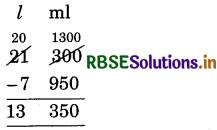
Question 5.
Atul has measures of 50 ml, 100 ml, 200 ml and 500 ml. How Atul measure the following measures so
that measure minimum times ?
(i) 2 l 750 ml
(ii) 3 l 800 ml
Solution:
(i) 2 l 750 ml
= 2000 ml + 750 ml = 2750 ml
= 55 × 500 ml + 200 ml + 50 ml
= 5 times 500 ml + 200 and 50 ml one time
(ii) 3 l 800 ml
= 3000 ml + 800 ml
= 3800 ml
= 7 times 500 ml + one time 200 ml + one time 100 ml

Question 6.
A kerosine can contains 5 1 kerosine. How many kerosine will be filled in 4 such cans?
Solution:
1 can contains kerosine = 5 l
4 cans contain kerosine = 5 × 4 = 20 l
Thus, 4 cans will contained 20 l kerosine.
Question 7.
One packet contains \(\frac{1}{2}\) l of milk. How many pockets are required for 2 l of milk?
Solution:
For \(\frac{1}{2}\) l milk pocket requires = 1
1 l milk packet requires = 2
1\(\frac{1}{2}\) l milk Packet requires = 3
2 l milk packet requires = 4
2\(\frac{1}{2}\) l milk packet requires = 5
∴ for 2\(\frac{1}{2}\) l milk 5 packets are required.

Question 8.
A shopkeeper sold oil, one day 80 l 50 ml, second day 68 l 250 ml. How much oil he sold in two days?
Solution:
Oil sold in first day = 80 l 50 ml
Oil sold in second day = 68 l 250 ml
Thus, total oil sold in 2 days = 148 l 300 ml
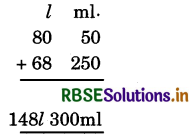
Thus, shopkeeper sold total 148 l 300 ml oil.
Question 9.
A confectioner had made mawa using 75 l milk in morning and 50 l milk in evening. Find how much milk he used to make mawa on Monday.
Solution:
Confectioner had made mawa using milk = 75 l 750 ml
In evening he used milk = 50 l 000 ml
Thus for mawa, total milk used = 125 l 750 ml
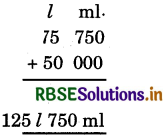
Thus, confectioner used 125 l 750 ml milk to prepare mawa on monday.

Question 10.
Doctor advised Sonu's mother to drink more water. She drinks 2\(\frac{1}{2}\) l of water daily then how much water she drink in 1 week?
Solution:
water drinks in 1 day = 2 l 500 ml.
Thus, she drinks water in 7 days = {2 l 500 ml) × 7
= 14 l + 3500 ml
= 14 l + 3 l 500 ml
= 17 l 500 ml = 17\(\frac{1}{2}\) l
Thus, Sonu's mother will drink 17\(\frac{1}{2}\) l water in 7 days.
Question 11.
One mikman sells 1\(\frac{1}{2}\) l, 2 l, 1 l of milk to three houses. Find out the total amount of milk sold by him.
Solution:
Milk sold in 1st house = 1\(\frac{1}{2}\) l
Milk sold in Ilnd house = 2 l
Milk sold is Hind house = 1 l
The told amount of milk sold = 1\(\frac{1}{2}\) l + 2 l + 1 l = 4\(\frac{1}{2}\) l
Thus, told 4\(\frac{1}{2}\) l milk sold.

Question 12.
How many drums having capacity of 10 litre can be filled from 320 Z litre capacity of kerosine oil tanker?
Solution:
Capacity of kerosine oil tanker = 320 l
Capacity of 1 drum = 10 l
There the number of drums can be filled 320 l = \(\frac{320}{10}\) = 32 drums
∴ Required drums = 32
Question 13.
Using measure of 100 ml, 200 ml and 250 ml at least how much milk can you measure in equal quantity?
Solution:
Using 100 ml, 200 ml and 250 ml measures, milk can be measured as
100 ml measure - 100, 200, 300, 400, 500, .............
200 ml measure - 200, 400, 600, 800, .........
250 ml measure - 250, 500, 750, 1000, 1250 ................

- RBSE Solutions for Class 5 Maths Chapter 11 Time
- RBSE Solutions for Class 5 Maths Chapter 17 मन गणित
- RBSE Solutions for Class 5 Maths in Hindi Medium & English Medium
- RBSE Solutions for Class 5 Maths Chapter 16 ज्यामिती
- RBSE Solutions for Class 5 Maths Chapter 15 धारिता
- RBSE Solutions for Class 5 Maths Chapter 14 परिमाप एवं क्षेत्रफल
- RBSE Solutions for Class 5 Maths Chapter 13 मापन (लंबाई)
- RBSE Solutions for Class 5 Maths Chapter 12 भार
- RBSE Solutions for Class 5 Maths Chapter 11 समय
- RBSE Solutions for Class 5 Maths Chapter 10 मुद्रा
- RBSE Solutions for Class 5 Maths Chapter 9 आँकड़े